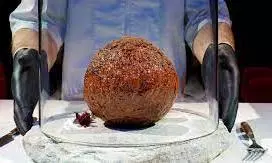
Food startup makes giant meatball with extinct mammoth DNA
text_fieldsCanberra: A food startup has created a giant meatball with a rare ingredient - the woolly mammoth DNA.
Australian company Vow focuses on engineering lab-grown meats and took to Twitter to announce that the meatball was made from extinct woolly mammoth DNA and fragments of African elephant DNA. "It's here! Introducing the #MammothMeatball, the world's first meat made from extinct animal protein. With @WunThompson, we're starting a conversation on what the future of food looks like (and from our view, it's pretty exciting)."
However, this meatball is not made for consumption. It will be displayed at a science museum - Netherlands science and medicine museum - in Amsterdam as an effort to draw attention to the potential of cultured meat.
"We chose the woolly mammoth because it’s a symbol of diversity loss and a symbol of climate change," said co-founder Tim Noakesmith. Mammoths are believed to be hunted to extinction and fully wiped out after the last ice age.
It is unclear whether humans can stomach mammoth meat. "Normally, we would taste our products and play around with them. But we were hesitant to immediately try and taste because we're talking about a protein that hasn't existed for 5,000 years. I've got no idea what the potential allergenicity might be of this particular protein," said the chief engineer.
In a press release, Vow said that the mammoth meat is made to showcase the potential of making planet-friendly eating habits. Usually, cultured meat is made using the blood of a dead calf. The startup this time tried an alternative which means no animals were killed. The statement from the food startup added that the engineering process utilised "new and innovative technology."
James Ryall, Vow's chief scientific officer, told CNN that he hopes that this project will spread the news about cultured meat. "The meatball aims to challenge the public and the meat industry to think differently about how we produce and consume food." The press note also highlighted that cultured meat is a viable alternative to traditional animal agriculture.
George Peppou, CEO of Vow, said that humans have a behaviour change problem when it comes to meat consumption. "The goal is to transition a few billion meat eaters away from eating [conventional] animal protein to eating things that can be produced in electrified systems. And we believe the best way to do that is to invent meat. We look for cells that are easy to grow, really tasty and nutritious, and then mix and match those cells to create really tasty meat."
The company has already probed the potential of over 50 species like alpaca, buffalo, crocodile, kangaroo, peacocks, and fish. Its first cultivated meat to be sold is Japanese quail which is going to be in restaurants in Singapore this year.






















